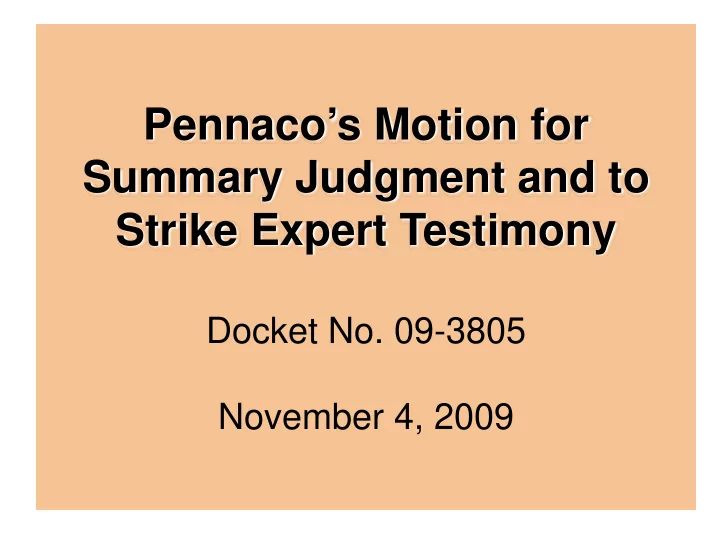

Pennaco’s Motion for Summary Judgment and to Strike Expert Testimony Docket No. 09-3805 November 4, 2009 1
Orientation to this Appeal � Marathon built a treatment plant to treat CBM water � Outfall 003 into perennial stream – Prairie Dog Creek � Outfall 002 into on-channel containment reservoir – Wildcat Creek � Two Claims by Petitioners � Permit limits not protective of irrigated alfalfa � DEQ did not use appropriate scientific methods 2
Permit Challengers have the Burden of Proof � The EQA does not specify here who has the burden of proof � “Where the statutes do not assign the burden of proof, the proponent of the order has both the initial burden of production and the ultimate burden of persuasion.” (Wyoming Supreme Court) 3
Permit Challengers have the Burden of Proof � Petitioners “request that the Council reverse the decision to issue permit WY0054364” (Amended Petition, Para. 4) � The order sought by Petitioners is reversal � The proponent of that order is Petitioners � Therefore, Petitioners have the burden of proof 4
Permit Challengers cannot shift the Burden of Proof � Petitioners claim DEQ and Permittee have the burden – but cite no persuasive authority � Petitioners don’t deny they have not met burden � They try to shift the burden to Pennaco: � Compare EQA Sec. 802 (Applicant has burden in permit refusal) � Pennaco can prove permit limits protective 5
Permit Challengers have the Burden of Proof � DEQ issued a final permit that is entitled to some presumption of correctness � It is “the general rule that, in the absence of evidence to the contrary, public officers will be presumed to have properly performed their duties and not to have acted illegally.” ( Williams v. Zoning Adjustment Bd., 383 P.2d 730, 733 (Wyo. 1963)) (“the burden is upon those complaining…to show that the board acted improperly.”) � DEQ not “throwing darts at a dartboard” (Petitioners’ Response at 8) 6
Do Permit Challengers have to do Anything? � Petitioners avoid their burden of proof � Petitioners also claim EQC has no authority to “rewrite” permit � They want to prevent a de novo hearing (EQC is limited to evidence before the DEQ, Response at 4-5) � They ignore EQC’s authority to modify a permit under EQA Sec. 112(c)(ii) (Response at 16) 7
Standard for Expert Testimony � Not admissible “unless…the type of evidence commonly relied upon by reasonably prudent men in the conduct of their serious affairs.” (WAPA § 108(a)) � Petitioners try to hide behind this standard and claim that the requirements for expert opinion in courts are not applicable � Ignore lack of reliability? � Ignore lack of expertise? � Ignore lack of knowledge? � Ignore lack of experience? � Ignore that opinions do not apply to central issue? 8
Petitioners’ Experts – Expertise? Central issue: are permit limits protective of irrigation? � Dr. Vance Deposition: � Q: “ Are you an irrigation expert?” � A: “No.” � Mr. O’Neill Deposition: � Q: “But you’re not an irrigation expert?” � A: “I am not an irrigation expert.” � “No idea” what a protective EC level is for alfalfa 9
Petitioners’ Experts – Knowledge? � Dr. Vance’s lack of knowledge: � Did not talk to landowners/irrigators � Did not review actual flow data in PDC � Did not know permit quantity allowed � Did not perform mixing analyses � Did not know flow requirements to irrigate � Did not know how irrigators use water � Did not know amount of water irrigators use � Did not conduct an on site soil investigation he admits is necessary 10
Petitioners’ Experts – Experience? � Mr. O’Neill’s lack of knowledge � No experience w/ CBM-produced water � No experience in EC or SAR water chemistry � No experience in soil or agronomy � Never read Ch. 1, Sec. 20, before this case � Never read Ag. Use Policy before this case � Never read Ch. 2, Sec. 9, before this case � No scientific research basis for opinions � Gives an opinion on “appropriate scientific method“ in regulation that he has never read before � Equates “appropriate scientific method” to “best scientific practice” 11
Petitioners’ Experts – Address the Issue? � Case issue = Sec. 20 “measurable decrease” caused? � Dr. Vance opinion � Never says measurable decrease might occur � Proposed an absolute non-degradation standard � Inconsistent with Sec. 20 � SAR � Neither Dr. Vance nor Mr. O’Neill offered any opinion on whether an SAR limit should be set � Dr. Vance expresses no opinion on “appropriate scientific method” 12
Petitioners’ Experts – Reliable? � Dr. Vance � Tier 1 limits are “of significant protection” (Oct. 24, 2008 Testimony to EQC) � SAR of 10 was protective, but now SAR of 3 is protective � No degradation of EC or sodium should be allowed � Contradicts Petitioners Sec. 20 claim and admission that Sec. 20 does not require permit limits to preserve ambient water quality 13
Standard for Expert Testimony � “Commonly relied upon by reasonably prudent men in the conduct of their serious affairs”? � Admitted non-experts in irrigation � Admitted lack of knowledge; proposes to change the Sec. 20 standard (Dr. Vance) � Admitted lack of expertise in applicable WWQRRs and telling EQC what regulations mean (Mr. O’Neill) 14
Outfall 002 � Containment of Paul 3 reservoir required � Whether Paul 3 “leaks” is irrelevant to permit limits � Carbon 13 isotope conclusions � Never done it (Vance, O’Neill) � Not an expert at it (Vance, O’Neill) � This portion of permit appeal clearly ripe for summary judgment 15
Conclusions – Why Summary Judgment? � EQC decision requires “substantial evidence” � Wyo. Supreme Court says that substantial evidence must include expert evidence in technical cases � On what basis could the EQC find permit limits not protective of irrigation? � Regardless of burden of proof, Petitioners’ experts’ opinions do not meet standard for admissibility 16
Recommend
More recommend